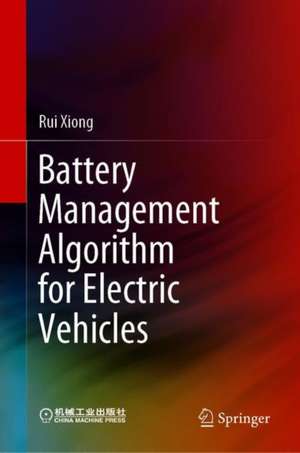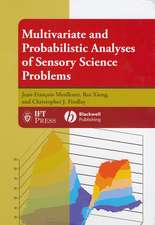Battery Management Algorithm for Electric Vehicles
Autor Rui Xiongen Limba Engleză Hardback – 8 oct 2019
This book systematically introduces readers to the core algorithms of battery management system (BMS) for electric vehicles. These algorithms cover most of the technical bottlenecks encountered in BMS applications, including battery system modeling, state of charge (SOC) and state of health (SOH) estimation, state of power (SOP) estimation, remaining useful life (RUL) prediction, heating at low temperature, and optimization of charging. The book not only presents these algorithms, but also discusses their background, as well as related experimental and hardware developments. The concise figures and program codes provided make the calculation process easy to follow and apply, while the results obtained are presented in a comparative way, allowing readers to intuitively grasp the characteristics of different algorithms.
Given its scope, the book is intended for researchers, senior undergraduate and graduate students, as well as engineers in the fields of electric vehiclesand energy storage.
Given its scope, the book is intended for researchers, senior undergraduate and graduate students, as well as engineers in the fields of electric vehiclesand energy storage.
| Toate formatele și edițiile | Preț | Express |
|---|---|---|
| Paperback (1) | 1108.84 lei 6-8 săpt. | |
| Springer Nature Singapore – 8 oct 2020 | 1108.84 lei 6-8 săpt. | |
| Hardback (1) | 1114.83 lei 6-8 săpt. | |
| Springer Nature Singapore – 8 oct 2019 | 1114.83 lei 6-8 săpt. |
Preț: 1114.83 lei
Preț vechi: 1359.55 lei
-18% Nou
Puncte Express: 1672
Preț estimativ în valută:
213.33€ • 228.12$ • 177.86£
213.33€ • 228.12$ • 177.86£
Carte tipărită la comandă
Livrare economică 17 aprilie-01 mai
Preluare comenzi: 021 569.72.76
Specificații
ISBN-13: 9789811502477
ISBN-10: 9811502471
Ilustrații: XVII, 297 p. 193 illus., 122 illus. in color.
Dimensiuni: 155 x 235 mm
Greutate: 0.62 kg
Ediția:1st ed. 2020
Editura: Springer Nature Singapore
Colecția Springer
Locul publicării:Singapore, Singapore
ISBN-10: 9811502471
Ilustrații: XVII, 297 p. 193 illus., 122 illus. in color.
Dimensiuni: 155 x 235 mm
Greutate: 0.62 kg
Ediția:1st ed. 2020
Editura: Springer Nature Singapore
Colecția Springer
Locul publicării:Singapore, Singapore
Cuprins
Overview of battery and its management.- Battery test.- Modeling theory of lithium-ion batteries.- Battery SOC and SOH estimation.- State estimation of battery system.- Remaining useful life prediction of lithium-ion batteries.- Low-temperature heating and optimal charging methods for lithium-ion batteries.- Algorithm development, test and evaluation.
Notă biografică
Dr. Rui Xiong received the Ph.D. degrees from Beijing Institute of Technology, Beijing, China in 2014. He is currently a Professor in the Department of Vehicle Engineering, Beijing Institute of Technology, China. Since 2017, he has been an Adjunct Professor in the Faculty of Science, Engineering and Technology, Swinburne University of Technology, Melbourne, Vic., Australia. His research interests mainly include electrical/hybrid vehicles, energy storage, and battery management system.
Dr. Xiong received the Highly Cited Researcher from Clarivate Analytics in 2018. He was a recipient of the First Prize of Natural Science Award of the Ministry of Education of China in 2018 and First Prize of the Chinese Automobile Industry Science and Technology Invention Award in 2018. He serves as an Associate Editor for the IEEE ACCESS and the SAE International Journal of Alternative Powertrains, and on the Editorial Board for the Applied Energy and eTransportation. He isthe Conference Chair of the 2017 International Symposium on Electric Vehicles (ISEV 2017), in Stockholm, Sweden, the 2018 and 2019 International Conference on Electric and Intelligent Vehicles (ICEIV 2018 and ICEIV 2019), in Melbourne, Australia and Stavanger, Norway, respectively.
Dr. Xiong received the Highly Cited Researcher from Clarivate Analytics in 2018. He was a recipient of the First Prize of Natural Science Award of the Ministry of Education of China in 2018 and First Prize of the Chinese Automobile Industry Science and Technology Invention Award in 2018. He serves as an Associate Editor for the IEEE ACCESS and the SAE International Journal of Alternative Powertrains, and on the Editorial Board for the Applied Energy and eTransportation. He isthe Conference Chair of the 2017 International Symposium on Electric Vehicles (ISEV 2017), in Stockholm, Sweden, the 2018 and 2019 International Conference on Electric and Intelligent Vehicles (ICEIV 2018 and ICEIV 2019), in Melbourne, Australia and Stavanger, Norway, respectively.
Textul de pe ultima copertă
This book systematically introduces readers to the core algorithms of battery management system (BMS) for electric vehicles. These algorithms cover most of the technical bottlenecks encountered in BMS applications, including battery system modeling, state of charge (SOC) and state of health (SOH) estimation, state of power (SOP) estimation, remaining useful life (RUL) prediction, heating at low temperature, and optimization of charging. The book not only presents these algorithms, but also discusses their background, as well as related experimental and hardware developments. The concise figures and program codes provided make the calculation process easy to follow and apply, while the results obtained are presented in a comparative way, allowing readers to intuitively grasp the characteristics of different algorithms.
Given its scope, the book is intended for researchers, senior undergraduate and graduate students, as well as engineers in the fields of electric vehiclesand energy storage.
Given its scope, the book is intended for researchers, senior undergraduate and graduate students, as well as engineers in the fields of electric vehiclesand energy storage.
Caracteristici
Provides a detailed introduction to, and comprehensive descriptions of, model-based state estimation methods Includes an extensive review of related heating and charging methods Describes the integration of model-based state of charge, state of health, and state of power estimators into battery management systems

























